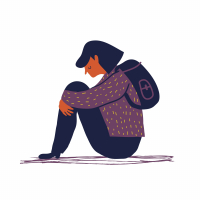Kids who recover more quickly from stress share certain traits, says GSE professor Jelena Obradović.

“We don’t have to wrap our kids in bubble wrap,” says GSE professor Jelena Obradović. (Photo: Getty Images/Anna Isaeva)
Could singing, dancing and playing peekaboo help kids learn to recover from challenging experiences?
Absolutely, according to Jelena Obradović, an associate professor at Stanford Graduate School of Education and director of the Stanford Project on Adaption and Resilience in Kids (SPARK).
In this episode of School’s In, Obradović joined GSE Dean Dan Schwartz and Senior Lecturer Denise Pope to talk about how early experiences shape children’s sensitivity and how those who are especially sensitive to stress and negative experiences can become more resilient.
Playful activities can teach kids how to manage their emotions and behaviors, she said, which is key to building the capacity to recover from stress. “We often want kids to behave in a certain way in the context of them acting out, showing anger or whatnot,” she said. “But there are a lot of ways to learn self-regulation in a positive way.”
Listen from the link below, and find more episodes of School's In at the Stanford Radio main page. The show airs Saturdays on SiriusXM Insight Channel 121.